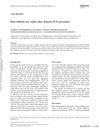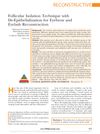 July 2015 in “Cambridge University Press eBooks”
July 2015 in “Cambridge University Press eBooks” The document concludes that careful history and physical exams are crucial for accurately diagnosing polycystic ovary syndrome and distinguishing it from other similar conditions.
 3 citations,
July 1993 in “Contraception”
3 citations,
July 1993 in “Contraception” Women with moderate body hair have higher levels of certain hormones and may benefit from treatment that increases sex hormone-binding protein.
 August 2023 in “Journal of controlled release”
August 2023 in “Journal of controlled release” STAR particles can improve the effectiveness of topical hair growth treatments without causing skin irritation.
 32 citations,
January 2018 in “American Journal of Clinical Dermatology”
32 citations,
January 2018 in “American Journal of Clinical Dermatology” Hormone therapy affects hair growth in transgender individuals, with testosterone potentially causing hair loss in trans men and estrogen reducing facial/body hair in trans women; treatment options vary.
 1 citations,
January 2018 in “Journal of cosmetology & trichology”
1 citations,
January 2018 in “Journal of cosmetology & trichology” Hair loss lotion with specific ingredients effectively improves hair growth and thickness safely.
 April 2011 in “Global journal of health science”
April 2011 in “Global journal of health science” Aldactone effectively reduces hair thickness in women with excessive hair growth, both alone and with other treatments.
 8 citations,
October 2017 in “Dermatology practical & conceptual”
8 citations,
October 2017 in “Dermatology practical & conceptual” A spermidine-based supplement may help hair grow longer by keeping it in the growth phase.
 April 2011 in “Global journal of health science”
April 2011 in “Global journal of health science” Spironolactone effectively makes hair shafts thinner in women with excessive hair growth.
 150 citations,
April 1999 in “Dermatologic Clinics”
150 citations,
April 1999 in “Dermatologic Clinics” Laser hair removal effectiveness depends on targeting hair structures without harming the skin, and improvements require more research and expert collaboration.
 63 citations,
May 2003 in “Journal of The European Academy of Dermatology and Venereology”
63 citations,
May 2003 in “Journal of The European Academy of Dermatology and Venereology” Minoxidil use increases facial hair growth in females, more in older users.
 33 citations,
October 1994 in “The Journal of Clinical Endocrinology and Metabolism”
33 citations,
October 1994 in “The Journal of Clinical Endocrinology and Metabolism” Finasteride reduces hair growth and is safe for women with excessive hair.
 40 citations,
January 2003 in “Gynecological Endocrinology”
40 citations,
January 2003 in “Gynecological Endocrinology” Finasteride effectively reduces hair growth in women with polycystic ovary syndrome or idiopathic hirsutism.
 July 2015 in “Actas Dermo-Sifiliográficas”
July 2015 in “Actas Dermo-Sifiliográficas” A woman experienced excessive hair growth after using a hair loss treatment with minoxidil.
 24 citations,
March 2002 in “Expert opinion on investigational drugs”
24 citations,
March 2002 in “Expert opinion on investigational drugs” Different anti-androgen medications can help treat excessive hair growth, but the right choice depends on accurate diagnosis.
 24 citations,
December 1988 in “British Journal of Dermatology”
24 citations,
December 1988 in “British Journal of Dermatology” Acne severity in women may not be linked to increased male hormone indicators like excess body hair, menstrual irregularities, or hair loss.
 22 citations,
January 2002 in “Treatments in endocrinology”
22 citations,
January 2002 in “Treatments in endocrinology” Birth control pills help treat skin and hair growth problems linked to high male hormone levels.
 1 citations,
September 2016 in “PubMed”
1 citations,
September 2016 in “PubMed” Using finasteride 0.5% solution with laser therapy significantly reduces unwanted facial hair in women.
 58 citations,
October 2001 in “Dermatologic Clinics”
58 citations,
October 2001 in “Dermatologic Clinics” Hair loss can indicate underlying systemic diseases and addressing these can sometimes reverse the hair loss.
 10 citations,
January 2003 in “Seminars in reproductive medicine”
10 citations,
January 2003 in “Seminars in reproductive medicine” The article explains how to identify and treat excessive hair growth in women, which can be distressing and may signal other health problems.
 48 citations,
February 2014 in “Fertility and Sterility”
48 citations,
February 2014 in “Fertility and Sterility” Women with PCOS often have hair loss, which is linked to acne or excess body hair but not to worse hormone or metabolic issues.
 25 citations,
December 2017 in “The Journal of Clinical Endocrinology & Metabolism”
25 citations,
December 2017 in “The Journal of Clinical Endocrinology & Metabolism” Birth control pills combined with bicalutamide are more effective at reducing excessive hair growth in women with PCOS than birth control pills alone.
 2 citations,
May 2015 in “Journal of Cosmetic and Laser Therapy”
2 citations,
May 2015 in “Journal of Cosmetic and Laser Therapy” Hair follicles can survive for a few days before transplant but are less viable over time.
 4 citations,
January 1989 in “Journal of Steroid Biochemistry”
4 citations,
January 1989 in “Journal of Steroid Biochemistry” Women with hyperandrogenism have higher androgen levels and lower SHBG, which may contribute to conditions like excessive hair growth and early puberty.
 48 citations,
April 2015 in “PLOS ONE”
48 citations,
April 2015 in “PLOS ONE” Excessive hair growth affects the quality of life of Iranian women with PCOS the most.
 12 citations,
September 2012 in “Plastic and Reconstructive Surgery”
12 citations,
September 2012 in “Plastic and Reconstructive Surgery” Adding de-epithelialization to the follicular isolation technique improves hair transplant results for eyebrows and eyelashes.
 6 citations,
March 1982 in “Clinical and Experimental Dermatology”
6 citations,
March 1982 in “Clinical and Experimental Dermatology” The document says that hair loss in women is often due to androgenic alopecia, similar to male baldness, and that hirsutism is treated with hormonal and cosmetic methods.
7 citations,
May 2021 in “Seizure” Some antiseizure medications can cause cosmetic problems like hair loss, excessive hair growth, acne, and gum overgrowth.
 3 citations,
February 2008 in “Basic and clinical dermatology”
3 citations,
February 2008 in “Basic and clinical dermatology” Telogen Effluvium is a hair loss condition where treatment involves identifying and managing its triggers.
 26 citations,
December 2011 in “Journal of Investigative Dermatology”
26 citations,
December 2011 in “Journal of Investigative Dermatology” New gene identification techniques have improved the understanding and classification of inherited hair disorders.
 January 2021 in “Journal of Scientific Research of the Banaras Hindu University”
January 2021 in “Journal of Scientific Research of the Banaras Hindu University” Lifestyle changes and medical treatment can help manage PCOS symptoms in young adults.




























